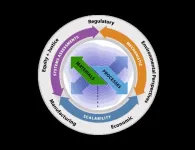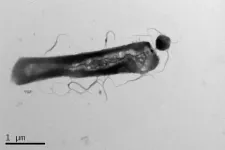(Press-News.org) In 2016, The Jackson Laboratory (JAX), a National Cancer Institute-designated Cancer Center and at the forefront of cancer research, launched the Maine Cancer Genomics Initiative (MCGI) to bring the latest progress in cancer care to rural Maine patients. Now, after successfully expanding access to genome tumor testing and targeted cancer treatments throughout Maine, the MCGI team provides compelling evidence that genome-matched treatments can provide significant patient benefit.
The MCGI report, published recently in npj Precision Oncology, presents data showing that only 17% of patients received genome-matched treatment through MCGI, signaling a large gap between testing and delivery of treatment based on genomic information. However, those who did receive genome-matched treatment were 31% less likely to die within one year compared to those who did not receive matched treatment. While this is an observational study, the findings clearly point to the potential for a significant one-year survival benefit from genomic tumor testing and matched treatments.
In this observational study, there were many reasons why cancer patients didn’t receive genome-matched treatments after the program sequenced the tumor’s DNA. A certain percentage of patients did not have an actionable tumor variant detected, so they received standard of care.
“For the rest, it was a matter of care delivery,” said Jens Rueter, M.D., chief medical officer of JAX and medical director of MCGI. “Patients may have had an actionable tumor variant but only through participation in a clinical trial that isn’t available in rural Maine, or a patient’s community hospital may not have been able to deliver a treatment that’s already on the market.”
Spearheaded by Rueter, who is also associate director for translational education at JAX Cancer Center and Edison Liu, M.D., former JAX President and CEO., the impetus for launching MCGI in 2016 was the lack of local access to recently developed genomic testing and targeted therapy strategies for cancer patients in Maine. In addition, most patients lacked the time and means to travel to Boston or New York for care. Therefore, JAX created MCGI to bring the latest technology in precision oncology and treatment to patients.
In only four years, through 2020, MCGI had partnered with every oncology practice in Maine (there are 13 of them) and enrolled more than 1,600 of their patients. Leah Graham, program director of MCGI, described that early work focused on providing genomic education to oncologists and other healthcare professionals, free access to genomic tumor testing for their patients, and detailed consultation about test results with precision oncology experts through a genomic tumor board.
Follow up with the MCGI patients revealed that of the 1,052 who did not receive genome-matched treatments, 399 (37.9%) died within 365 days of consent. This compares with 30.6% (63 of 206) in the genome-matched group. After adjusting for baseline characteristics, the analysis showed that the genome-matched group was 31% less likely to die within the first year than those who received standard care, even though only 9% were able to participate in a clinical trial, a smaller share than previously reported by other studies and might be explained by the rurality of Maine.
The percentage of tested patients who received genome-matched treatments in the MCGI study—17%--exactly matched the figure found in a larger 2019 Veteran Affairs study, suggesting that delivery of cancer care is not just limited to Maine. Moving forward, the MCGI program will focus more on enabling effective precision oncology care delivery, whether it’s through its Genomic Tumor Board program, providing access to more biomarker-driven clinical trials within Maine or using mobile outreach to bring treatments directly to patients who might not be able to access it otherwise.
The study carries with it several limitations. Patients were primarily white and non-Hispanic, reflecting the population characteristics in Maine; the genomic tumor testing was provided free of charge, potentially expanding its use; the study population also had variable cancer sites and stages.
“Nonetheless, we’ve been offering this program for seven years now, and we can see some really positive impacts on patient outcomes,” said Rueter. “And in the future, we want to do on a population level what we’re now doing in Maine with MCGI, meaning that every patient receives genomic tumor testing and a thorough biomarker analysis. How we deliver care and how we expand access to clinical trials through MCGI can be a blueprint for other states across the country, especially those with significant rural areas.”
END
Study indicates that cancer patients gain important benefits from genome-matched treatments
Maine cancer patients experienced better outcomes following genomic tumor testing to guide targeted therapy strategies; but a gap between testing and clinical delivery still exists
2024-05-01
ELSE PRESS RELEASES FROM THIS DATE:
Gift to UCR clinic aims to assist local unhoused population
2024-05-01
RIVERSIDE, Calif. -- The Hulen Place Clinic, which UCR Health, the clinical arm of the School of Medicine (SOM) at the University of California, Riverside, opened in September 2023 to address the health and well-being of the unhoused and underserved populations in the County of Riverside has received a gift of $500,000 from the San Manuel Band of Mission Indians, a sovereign American Indian tribe of Serrano people in San Bernardino County, California.
Located about two miles from downtown Riverside and adjacent to an emergency shelter and temporary ...
Research breakthrough on birth defect affecting brain size
2024-05-01
RIVERSIDE, Calif. -- Nonsense-mediated RNA decay, or NMD, is an evolutionarily conserved molecular mechanism in which potentially defective messenger RNAs, or mRNAs (genetic material that instructs the body on how to make proteins), are degraded. Disruption of the NMD pathway can lead to neurological disorders, immune diseases, cancers, and other pathologies. Mutations in human NMD regulators are seen in neurodevelopmental disorders, including autism and intellectual disability.
Why NMD mutations are enriched ...
Researchers offer US roadmap to close the carbon cycle
2024-05-01
Scientists at Oak Ridge National Laboratory and six other Department of Energy national laboratories have developed a United States-based perspective for achieving net-zero carbon emissions. The roadmap was recently published in the journal Nature Reviews Chemistry.
The researchers from the DOE laboratories — ORNL, Pacific Northwest National Laboratory, Brookhaven National Laboratory, Argonne National Laboratory, Lawrence Berkeley National Laboratory, Ames National Laboratory and SLAC National Accelerator Laboratory — pooled their diverse expertise to devise a roadmap to “defossilize” portions of the U.S. economy by reducing carbon emissions ...
Precipitation may brighten Colorado River’s future
2024-05-01
The Colorado River’s future may be a little brighter than expected, according to a new modeling study from CIRES researchers. Warming temperatures, which deplete water in the river, have raised doubts the Colorado River could recover from a multi-decade drought. The new study fully accounts for both rising temperatures and precipitation in the Colorado’s headwaters, and finds precipitation, not temperature, will likely continue to dictate the flow of the river for the next 25 years.
Precipitation falling in the river’s headwaters region is likely to be more abundant ...
Identifying risks of human flea infestations in plague-endemic areas of Madagascar
2024-05-01
Madagascar is one of the last places where outbreaks of human bubonic plague still happen regularly.
Fleas carrying the plague bacterium Yersinia pestis can spread the disease through their bites. And while a species commonly known as “the rat flea” has been fingered as the main culprit in plague outbreaks, a species known as “the human flea” may play a secondary role.
As an investigator during plague outbreaks in rural Madagascar, medical entomologist Adelaide Miarinjara knew that many households were teeming with these human fleas. Miarinjara grew up in the ...
Archaea can be picky parasites
2024-05-01
A parasite that not only feeds of its host, but also makes the host change its own metabolism and thus biology. NIOZ microbiologists Su Ding and Joshua Hamm, Nicole Bale, Jaap Damsté and Anja Spang have shown this for the very first time in a specific group of parasitic microbes, so-called DPANN archea. Their study, published in Nature Communications, shows that these archaea are very ‘picky eaters’, which might drive their hosts to change the menu.
Archaea are a distinct group of microbes, similar to bacteria [see box]. The team of NIOZ microbiologists studies the so-called ...
EPA underestimates methane emissions from landfills, urban areas
2024-05-01
The Environmental Protection Agency (EPA) is underestimating methane emissions from landfills, urban areas and U.S. states, according to a new study led by researchers at the Harvard John A. Paulson School of Engineering and Applied Sciences (SEAS).
The researchers combined 2019 satellite observations with an atmospheric transport model to generate a high-resolution map of methane emissions, which was then compared to EPA estimates from the same year. The researchers found:
Methane emissions from landfills are 51% higher compared to EPA estimates
Methane emissions from 95 urban areas are 39% higher than EPA estimates
Methane emissions ...
Feathers, cognition and global consumerism in colonial Amazonia
2024-05-01
Amazonia is the home of the largest variety of birds in the world. In such a unique environment, craft cultures have flourished by translating the beauty and creativity of environmental materials like feathers into stunning pieces of art. “The Material Creativity of Affective Artifacts in the Dutch Colonial World,” a new article in Current Anthropology by Stefan Hanß of the University of Manchester, examines artisanal featherwork within the context of early modern colonialism ...
Satellite images of plants’ fluorescence can predict crop yields
2024-05-01
ITHACA, N.Y. – Cornell University researchers and collaborators have developed a new framework that allows scientists to predict crop yield without the need for enormous amounts of high-quality data – which is often scarce in developing countries, especially those facing heightened food insecurity and climate risk.
In many parts of the world, crop yields are dropping, largely due to the effects of climate change. According to a recent Cornell study, over the last four decades, for every 1 degree Celsius of warming, net farm income decreased by 66%.
Farmers in developed countries can often rely on big datasets ...
Machine learning tool identifies rare, undiagnosed immune disorders through patients’ electronic health records
2024-05-01
Researchers say a machine learning tool can identify many patients with rare, undiagnosed diseases years earlier, potentially improving outcomes and reducing cost and morbidity. The findings, led by researchers at UCLA Health, are described in Science Translational Medicine.
“Patients who have rare diseases may face prolonged delays in diagnosis and treatment, resulting in unnecessary testing, progressive illness, psychological stresses, and financial burdens,” said Manish Butte, MD, PhD, a UCLA professor in pediatrics, human genetics, and microbiology/immunology who cares for these patients in his clinic at UCLA. “Machine learning and other artificial intelligence ...
LAST 30 PRESS RELEASES:
CU Anschutz School of Medicine receives best ranking in NIH funding in 20 years
Mayo Clinic opens patient information office in Cayman Islands
Phonon lasers unlock ultrabroadband acoustic frequency combs
Babies with an increased likelihood of autism may struggle to settle into deep, restorative sleep, according to a new study from the University of East Anglia.
National Reactor Innovation Center opens Molten Salt Thermophysical Examination Capability at INL
International Progressive MS Alliance awards €6.9 million to three studies researching therapies to address common symptoms of progressive MS
Can your soil’s color predict its health?
Biochar nanomaterials could transform medicine, energy, and climate solutions
Turning waste into power: scientists convert discarded phone batteries and industrial lignin into high-performance sodium battery materials
PhD student maps mysterious upper atmosphere of Uranus for the first time
Idaho National Laboratory to accelerate nuclear energy deployment with NVIDIA AI through the Genesis Mission
Blood test could help guide treatment decisions in germ cell tumors
New ‘scimitar-crested’ Spinosaurus species discovered in the central Sahara
“Cyborg” pancreatic organoids can monitor the maturation of islet cells
Technique to extract concepts from AI models can help steer and monitor model outputs
Study clarifies the cancer genome in domestic cats
Crested Spinosaurus fossil was aquatic, but lived 1,000 kilometers from the Tethys Sea
MULTI-evolve: Rapid evolution of complex multi-mutant proteins
A new method to steer AI output uncovers vulnerabilities and potential improvements
Why some objects in space look like snowmen
Flickering glacial climate may have shaped early human evolution
First AHA/ACC acute pulmonary embolism guideline: prompt diagnosis and treatment are key
Could “cyborg” transplants replace pancreatic tissue damaged by diabetes?
Hearing a molecule’s solo performance
Justice after trauma? Race, red tape keep sexual assault victims from compensation
Columbia researchers awarded ARPA-H funding to speed diagnosis of lymphatic disorders
James R. Downing, MD, to step down as president and CEO of St. Jude Children’s Research Hospital in late 2026
A remote-controlled CAR-T for safer immunotherapy
UT College of Veterinary Medicine dean elected Fellow of the American Academy of Microbiology
AERA selects 34 exemplary scholars as 2026 Fellows
[Press-News.org] Study indicates that cancer patients gain important benefits from genome-matched treatmentsMaine cancer patients experienced better outcomes following genomic tumor testing to guide targeted therapy strategies; but a gap between testing and clinical delivery still exists



